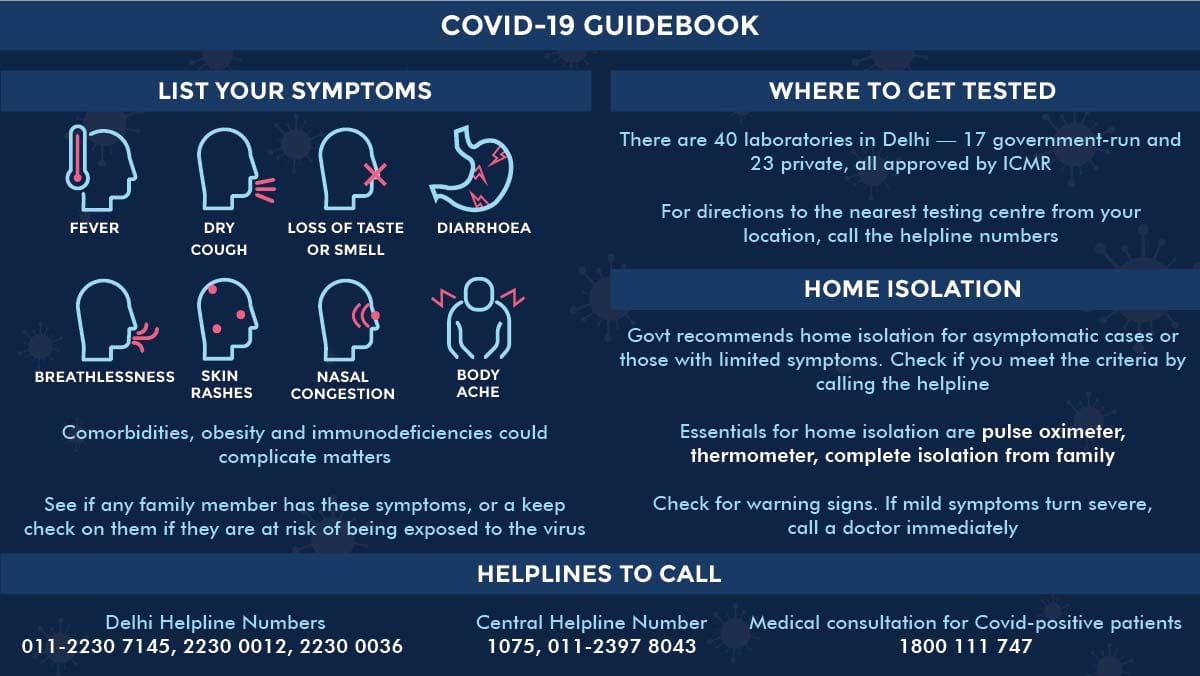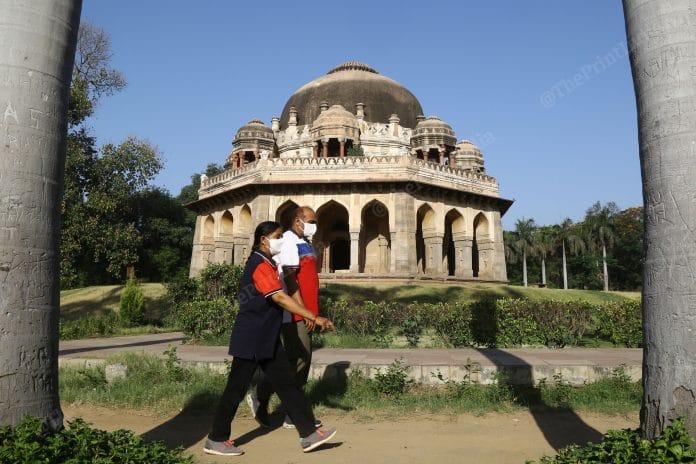New Delhi: Novel coronavirus cases in Delhi crossed the 92,000 mark Friday, with a new record for highest infections being set almost every day. The death toll, too, is inching closer to the 3,000-mark by the day.
These numbers, coupled with news reports of patients having been denied hospital beds in the past, have given rise to panic, anxiety and a general uncertainty about what to do if one does get infected with Covid-19 in the national capital.
But doctors and health experts caution against this kind of helplessness, and say that even if someone begins to feel the symptoms, there are still many things one can do. They suggest a step-wise guide to dealing with Covid symptoms.
Also read: Resource crunch, anxious relatives, bad press — woes of LNJP, Delhi’s main Covid hospital
List out your symptoms, determine your risk
While it is an ever-evolving disease, so far, we know the novel coronavirus may be accompanied by one or all of the following symptoms: fever, dry cough, tightness of chest, loss of taste or smell, diarrhoea, breathlessness, fatigue, body ache, nasal congestion, skin rashes or discoloration of fingers or toes.
To help suspected Covid patients navigate through the barrage of information coming their way, without feeling overwhelmed, healthcare professionals launched a Delhi-based helpline in collaboration with the World Health Organization (WHO) in February: +91 9015921922. Close to 60 healthcare workers, referred to as Covid marshals, answer the calls, usually made by panic-stricken people realising either they, or someone in their family is showing symptoms.
The marshals begin their consultation by taking a detailed history of the patient, and their questions can come in handy for anyone trying to make sense of their own symptoms at home. These include: symptoms and their duration, their pattern (whether they are progressing or regressing with time) and, most importantly, whether they or anyone in their family and home is high-risk — that is, have existing comorbidities.
“Then we try and get them to trace their contact history — have they been stepping out, what is the nature of their profession, who have they met in the last 10 days,” said Roopa Rawat, the chief coordinator of the WHO Collaborating Centre for Emergency and Trauma Care.
The Kejriwal government has also launched a number of coronavirus helpline numbers. When ThePrint called 011-22307145, the call receiver said the helpline is to guide people about test centres. “We don’t give medical guidance. But we tell people where they can go to avail tests, based on their location. Some people have questions about the number of positive patients in their area, we tell them that too,” the staffer said.
Another helpline number — 1800 111747 — helps Covid-positive patients receive medical consultation. Patients can call the number to get in touch with a doctor if their symptoms worsen, and can also speak to a mental health expert in case of increasing anxiety.

Many healthcare professionals agree that identifying your symptoms and determining your own risk are the first two important steps. “The patient needs to determine his or her own risk: do you have any comorbidities, are you obese, do you have any immunodeficiency. If not, then look around and see if any of your family members fall in this category,” said Shweta Raina, a resident doctor in a government hospital in Delhi.
“When the patient talks about their symptoms or the lack of them out loud, it helps calm their anxiety and sometimes also shows that it was just a false alarm. But listing out your symptoms and medical history always helps,” Raina added. Based on the answer to these questions, it can then be decided whether to opt for home isolation or hospital admission.
Also read: Ramdev says Coronil approved for ‘Covid management’, but govt insists it’s only for immunity
Oximeter, thermometer, distance: your essentials for home isolation
According to WHO, 80 per cent of people recover from Covid-19 without needing hospital treatment. Rawat and her fellow Covid marshals have observed the same 80-20 rule.
Dr R. Gangakhedkar, senior scientist who retired from the Indian Council of Medical Research (ICMR) earlier this week, had also made a similar analysis in April. “At least 80 out of every 100 Covid-19 patients may be asymptomatic or could be showing mild symptoms. It takes a few days before an infected person begins to show symptoms and the probability of being detected positive is highest when symptoms begin to show,” he had said at a press briefing.
Many with mild symptoms, who haven’t gotten tested yet, fear that they might just end up giving the virus to their high-risk family members — typically their parents. “So they feel that testing will help. But the issue is that there is a high chance of a false negative, since the test is not detecting the virus, but the viral load. So in cases of mild symptoms, it’s best to home isolate even if you haven’t gotten tested,” said Rawat, who has been a nurse for over 15 years.
“We always recommend home isolation to those who are asymptomatic or those with limited symptoms. Going to a hospital even to get tested means that you are just increasing your chances of contracting the virus,” she said.
And even while in home isolation, doctors say there are some essentials to be followed. “Practice deep breathing exercises. Make sure your caregiver is a young, healthy person who always wears a mask while interacting with you. A thermometer and a pulse oximeter are musts,” Raina said.
A pulse oximeter is a device meant to measure an individual’s oxygen saturation. Covid-19 patients are often found to be suffering from happy hypoxia — a condition in which they might appear to be completely healthy and don’t struggle with breathing, but their oxygen levels are actually so low that they are “seemingly incompatible with life”. Many patients have complained of feeling delirious in the condition.
Normal blood-oxygen saturation is between 95 and 100 per cent — anything below 95 is cause for worry, doctors say. Delhi CM Arvind Kejriwal announced last Monday that the government will be distributing pulse oximeters to patients in home isolation.
Also read: How Facebook groups, websites are helping Covid patients connect with plasma donors
Criteria for institutional isolation and hospitalisation
The Central government last week revoked its earlier order that mandated five-day institutional quarantine for every Covid-19 patient. Now, only those who do not require hospitalisation and do not have adequate facilities for home isolation are required to be in institutional isolation.
Following this, a statement issued by the state disaster management authority (SDMA) clarified: “The patient shall be allowed home isolation if, as per the assessment of Home Isolation team sent by the District Surveillance Officer, the patient is mild/pre-symptomatic/asymptomatic and has a residence of two rooms or a separate room and a separate toilet for the patient.”
If the said patient has moderate/severe symptoms with co-morbidities, she will be transferred to a hospital or care centre, the statement added.
Raina adds, “If you are home isolating, the most important thing to keep in mind is to protect the high-risk patients. Isolate them in a room too, if you have too. Saving our old and sick is what we have learnt from Spain and Italy.”
Also read: No need for govt doctor prescription for Covid test, contact-tracing must: Modi govt to states
Increased testing is showing results
After the Modi government’s intervention last week, testing numbers have been climbing and the positivity rate in the city is starting to come down. CM Kejriwal said Wednesday that the positivity rate has gone down from 31 per cent to 13 per cent.
At the moment, 40 laboratories in Delhi — 17 government-run and 23 private — have been approved for Covid-19 testing by the ICMR.
In a series of tweets last week, the Ministry of Home Affairs had written: “Sample testing has been doubled immediately in pursuance of decisions taken by HM @AmitShah in series of meetings…”
On directions of HM @AmitShah to increase testing capacity & quick delivery of results in Delhi – testing via Rapid Antigen testing methodology was started yesterday. 7040 people have been tested in 193 testing Centres. Testing will continue with increased numbers in coming days.
— Spokesperson, Ministry of Home Affairs (@PIBHomeAffairs) June 19, 2020
Doctors do caution, though, that while rapid antigen tests give faster results, don’t require a specialised laboratory and are cheaper than the commonly used RT-PCR test, the latter is still the “golden standard”.
“Antigen tests can give false negatives, so all antigen samples that test negative will have to be confirmed via an RT-PCR test. So if someone is severely symptomatic, then they must opt for RT-PCR,” Avi Kumar, a pulmonologist at Delhi’s Fortis Escorts Heart Institute told ThePrint.
To those with mild or no symptoms, Kumar advises, “If you are in home isolation, constantly keep an eye out for the warning signs, particularly the oxygen level. If your symptoms suddenly begin getting serious, consult your doctor and get admitted to a hospital if they recommend so.”
So far, the national capital has five government and three private hospitals solely dedicated to Covid-19 treatment, while most of the remaining hospitals have 20 per cent beds reserved for Covid patients.
But whether one needs home isolation or hospital treatment, all experts agree that having a calm mind is of the highest importance. “Mental calmness and preparedness is very important at this time. Also, don’t stigmatise others if they contract the virus, and don’t stigmatise yourself if you get infected either,” Raina said.
Also read: Prior Covid testing not required before admitting pregnant women, Delhi govt tells HC






